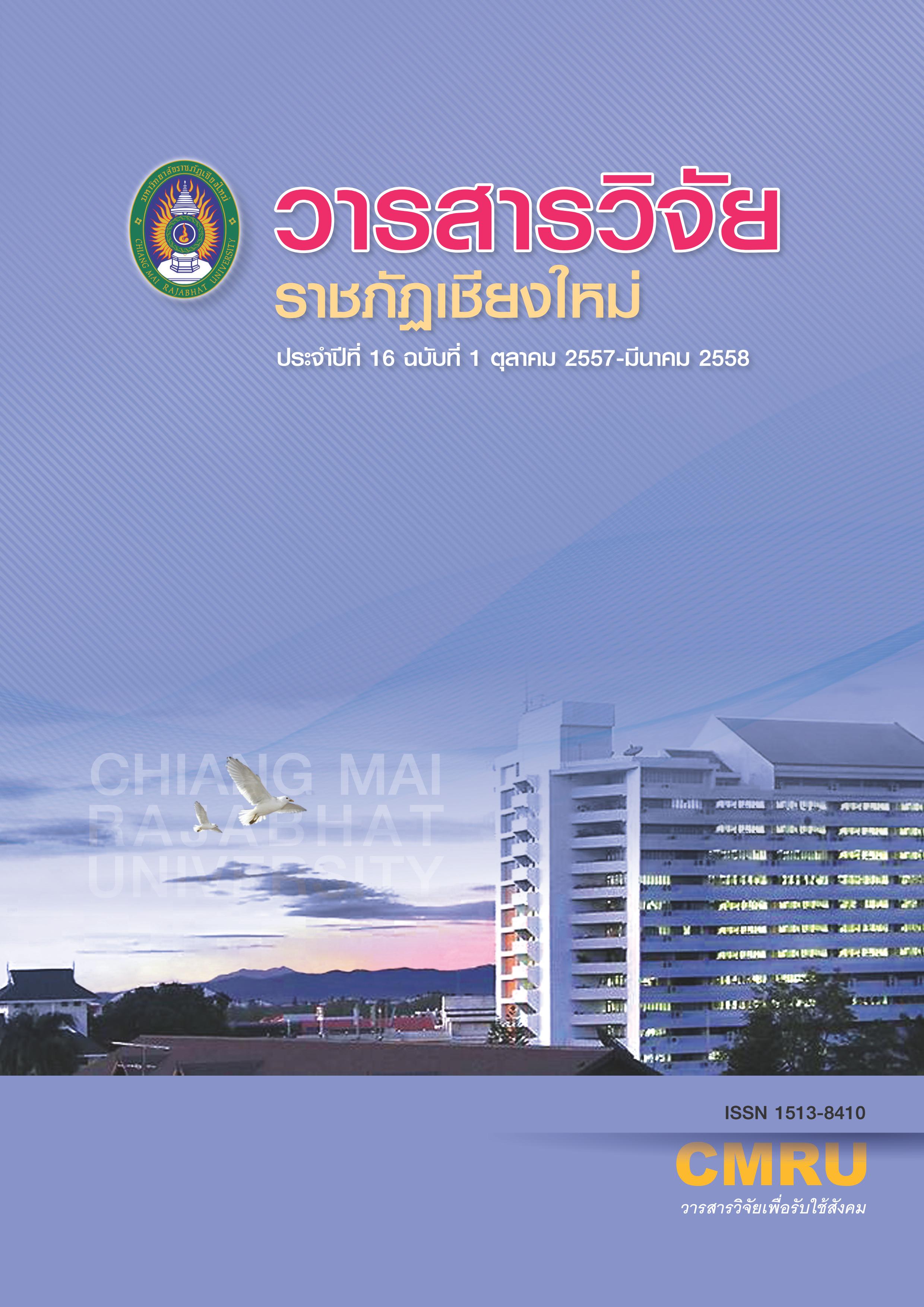An Experiment for Developing Democracy Ways of Life of Ninth Grade Student Li District Lamphun Province
DOI:
https://doi.org/10.14456/rcmrj.2015.215107Keywords:
Develop democracy ways, ninth grade students, Lamphun ProvinceAbstract
An experiment of developing democracy ways was divided into two phases: phase 1 dealt with factors affecting democracy ways of the students by interviewing them so as to use the data for constructing the model of activity for developing democracy ways; phase 2 was quasi-experimental research. It was aimed to experiment developing democracy ways of the students in terms of knowledge, attitude, and behavior through activity inspiring the consciousness of citizenship in school. The study sampling units were the ninth grade students, Li district, Lamphun Province, who enrolled in academic year 2557. The students of experiment group were those of Wiangjedeewittaya School, Li district, Lamphun Province, totally 67, while the students of control group were those of Maetuenwittaya School, Li district, Lamphun Province, totally 58. Before the experiment conducted, the pre-test was made in order to measure the democracy ways of the students in terms of knowledge, attitude, and behavior of both the experiment and control groups. After the students of experiment group completed their participation in activity for developing democracy ways through activity inspiring the consciousness of citizenship in school, the post-test was made of both the experiment and control groups. After that, results of the two tests were analyzed by means of statistical comparison. Results of the experiment showed that the score average of democracy ways of the experiment group, both before and after the experiment, was found different with statistical significance at .001, that is, the students who participated in activity inspiring the consciousness of citizenship in school dramatically increased, and was higher than that of those who did not participate in activity for developing democracy ways through activity inspiring the consciousness of citizenship in school. The development of democracy ways was actually the student development, which started out with creating democratic knowledge and understanding, and then adjusting their attitude till it led to behavioral change in living a life according to developing democracy ways. Therefore, the guidelines for developing the aforesaid democracy ways could be used to develop substantially the democracy ways of the ninth grade students.
Downloads
References
กระทรวงศึกษาธิการ. 2551. หลักสูตรแกนกลางการศึกษาขั้นพื้นฐาน พุทธศักราช 2551. กรุงเทพฯ: ชุมนุมสหกรณ์การเกษตรแห่งประเทศไทย.
ณรงค์ สินสวัสดิ์. 2539. การเมืองไทย การวิเคราะห์เชิงจิตวิทยา. กรุงเทพฯ: วัชรินทร์.
ทิศนา แขมมณี. 2530. นักประชาธิปไตยน้อย ความสำเร็จแค่เอื้อม, ในทิศทางที่ท้าทาย. กรุงเทพฯ: คณะครุศาสตร์ จุฬาลงกรณ์มหาวิทยาลัย.
นรินทร์ชัย พัฒนพงศา. 2542. การสื่อสาร-รณรงค์เชิงยุทธศาตร์เพื่อเปลี่ยนพฤติกรรมมนุษย์เน้นการเจาะจงกลุ่มและมีส่วนร่วม. กรุงเทพฯ: ลินคอร์นโปรโมชั่น.
บรรจง ชูชาติสกุล. 2534. ประชาธิปไตยในโรงเรียน. วารสารวิทยาจารย์. 89: 8–11.
บัญญัติ สมชอบ. 2533. แนวคิดของครูสังคมศึกษาในการเสริมสร้างคุณลักษณะประชาธิปไตยแก่นักเรียนมัธยมศึกษา จังหวัดยโสธร. กรุงเทพฯ: จุฬาลงกรณ์มหาวิทยาลัย.
บุญชม ศรีสะอาด. 2547. การวิจัยเบื้องต้น. กรุงเทพฯ: สุวีริยาสาส์น.
ศรัณยู หมั้นทรัพย์. 2554. ภาคประชาสังคมกับการแก้ไขปัญหาการเมืองไทย: การใช้เงินในการหาเสียงเลือกตั้ง. กรุงเทพฯ: สถาบันพระปกเกล้า.
สุภางค์ จันทวานิช. 2542. การวิเคราะห์ข้อมูลในการวิจัยเชิงคุณภาพ. กรุงเทพฯ: จุฬาลงกรณ์มหาวิทยาลัย.
อารีย์ โพธิ์บางหวาย. 2550. การพัฒนารูปแบบการบริหาร เพื่อพัฒนาจิตสำนึกประชาธิปไตยของนักเรียนประถมศึกษา ในเขตภาคเหนือตอนล่าง. ปริญญาการศึกษาดุษฎีบัณฑิต สาขาวิชาบริหารการศึกษา มหาวิทยาลัยนเรศวร.
Grotius, H. 1625. On the Laws of War and Peace. New. York: Walter J. Black.
Locke, J. 1931. An Essay concerning the Understanding knowledge opinion and Assent. Cambridge: Benjamin Rand.
Downloads
Published
How to Cite
Issue
Section
License
1. Articles, information, content, images, etc published in the “Community and Social Development Journal” are copyrighted by the Community and Social Development Journal, Chiang Mai Rajabhat University. In order to properly distribute the articles through print and electronic media, the authors still hold the copyright for the published articles under the Creative Commons Attribution (CC BY) license, which allows the re-distribution of the articles in other sources. References must be made to the articles in the journal. The authors are responsible for requesting permission to reproduce copyrighted content from other sources.
2. The content of the articles appearing in the journal is the direct responsibility of the article authors. The editorial board of the journal does not necessarily agree with or share any responsibility.














